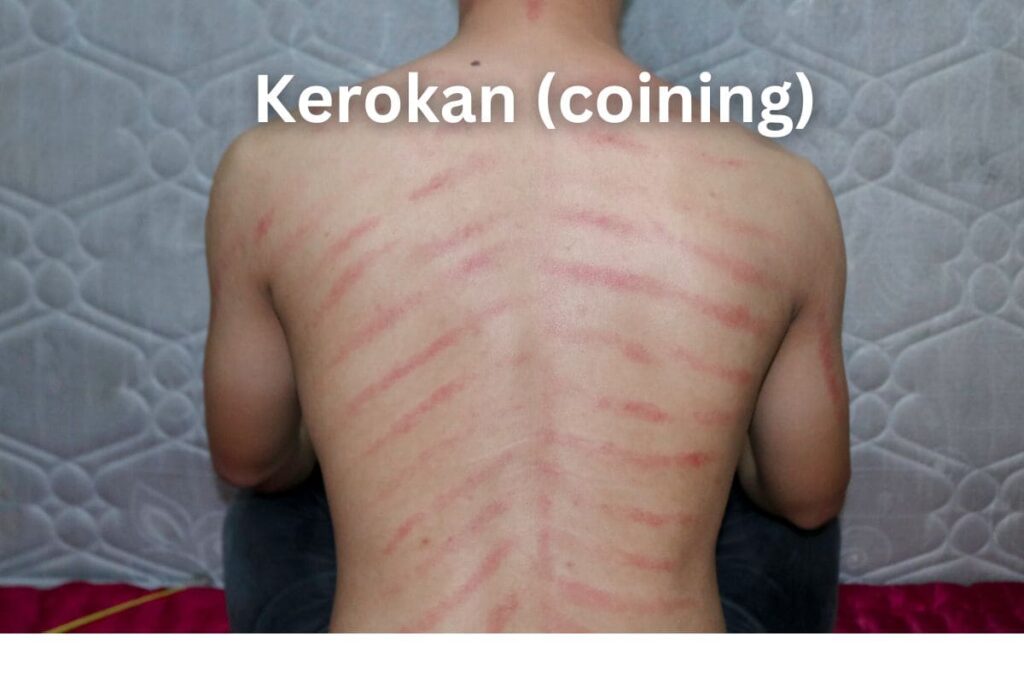In Indonesia, there’s a term called “Masuk Angin”. It means “enter wind”. Imagine feeling a bit sick, like having a cold, or feeling bloated. That’s what many Indonesians call “Masuk Angin”. They believe it’s when the wind gets inside the body. This idea is very old in Indonesia and it’s part of culture. Many people would say I have Masuk Angin when they’re feeling sick. It’s not just a simple term. Even when I visit a doctor, sometimes they would say you have Masuk Angin.
It’s tied to deep beliefs and traditions. Many grow up hearing about it from their families. They learn special ways to feel better when they have “Masuk Angin”. Some might use herbs. Others might use special massages like kerokan. It’s a shared experience in Indonesia. It connects the past to the present. In this article I’ll talk about Masuk Angin.
The Science and Myths of Masuk Angin
Going further back into history, Masuk Angin emerges as a blend of folklore and observed health patterns. Grandparents share stories with their grandchildren about the importance of staying shielded from strong breezes, especially during certain times of the day. The stories, which have been passed down through generations, established the idea in people’s minds.
When we turn to the medical community, we find a different perspective. While doctors recognize the symptoms described under “Masuk Angin”, many see them as signs of various conditions, not just one specific ailment. They might address the dizziness, the fatigue, or the upset stomach, but the idea of “wind” as a cause remains debatable.
This divergence in views creates a rich tapestry of understanding. “Masuk Angin” is not just about health; it’s a cultural touchstone. It showcases the dance between tradition and science, reminding us that health beliefs are as diverse as the people who hold them.
Symptoms of Masuk Angin
Let’s break the symptoms down of Masuk Angin:
- Feeling Tired: It’s like when you’ve had a long day, and you just can’t shake off the tiredness.
- Dizziness: Imagine standing up too fast and feeling the world spin a bit.
- Nausea: That uneasy feeling in your stomach, like you might be sick.
- Upset Stomach: It could be a bit of pain or just feeling bloated.
- Cold Sweats: Even if it’s hot outside, you might feel cold and sweaty.
- Feeling Chilly: Like when you’re coming down with a cold and can’t get warm.
Now, if you think, “These sound like common symptoms,” you’re right. A lot of these signs are similar to what we feel when we have a cold or the flu. In Western countries, you might say you got a bug or a virus. In Indonesia, the wind gets the blame.
It’s interesting how different cultures describe health. In the end, whether it’s a cold wind or a cold virus, the feelings are real. And understanding “Masuk Angin” helps us see how health is a mix of facts, feelings, and stories from around the world. TIP: stay healthy with Indonesian Fruit.
Traditional Treatments: Kerokan and Jamu

When someone in Indonesia says they have “Masuk Angin”, there are some traditional ways to help them feel better. One of the most known methods is “Kerokan”. It’s a skin scraping technique. The idea is to get the wind out of the body. A coin or spoon is used to scrape the skin until it turns red. This might sound odd, but it’s a trusted method for many.
Another popular remedy is “Jamu”. It’s a herbal drink. People believe it can cure many things, including “Masuk Angin”. It’s made from natural ingredients and has been used for centuries.
Now, about “coining”. This is similar to “Kerokan”. It’s also called “mengerok” or “kerik”. It’s not just in Indonesia. Many Southeast Asians use it. But when they moved to Western countries, some people saw it as harmful. They didn’t understand the cultural meaning behind it.
If you have used “minyak ayu putih”, some oil to rub clock wise on your stomach, than you’ve been treated for the symptoms as well. It’s a oil to keep the warmth of your body inside. It is also used to prevent masuk angin.
In Southeast Asia, wind is not just air moving around. It has deep cultural meanings. People believe it can affect health. That’s why “Masuk Angin” is so important. It’s about the wind and health coming together.
Everyday life shows this view. For example, in cold places, you might see Indonesians dressed very tightly. They want to protect against the wind. It’s a mix of health, religion, and tradition. It’s a way of life that’s been around for a long time in Indonesia.
Is Masuk Angin Real? A Medical Perspective

In the medical world, things are a bit different. Most doctors look for causes like viruses or bacteria when someone is sick. They use tests and check symptoms. So, when someone says they have “Masuk Angin”, a doctor might not see it as one specific illness. Instead, they might think the person has a cold, the flu, or another common sickness.
But here’s the thing: even if doctors don’t see “Masuk Angin” as a medical condition, they understand it’s important for many people. It’s a way for their patients to express themselves, and the doctors do recognize it.
In short, while “Masuk Angin” might not be in medical books, it’s real for many. It’s a mix of culture, history, and health. And understanding that helps doctors care for their patients better.
Modern Treatments and Approaches for Masuk Angin
In modern clinics, if someone feels tired or has an upset stomach, tests might be done. These can check for things like viruses or infections. The treatment might be medicine, rest, or other advice. It’s a different approach from traditional beliefs about the wind.
But here’s the interesting part: many doctors in Indonesia know about both worlds. They understand “Masuk Angin” and its cultural meaning. So, while they might give modern medicine, they also respect traditional beliefs. Some doctors might even suggest both. For example, a patient could get medicine for a cold and also advice on traditional ways to feel better.
It all comes down to helping the patient. Whether it’s with a pill, a herbal drink, or both, the objective is to make people feel better. And in countries like Indonesia, that means mixing the modern with the ancient.
Masuk Angin in Other Cultures
In some neighboring countries, people also believe in the power of the wind. They think it can affect health. The names might be different, but the idea is the same. For example, in Malaysia, they have a term called “angin”. It’s close to “Masuk Angin” and means wind too.
What’s clear is this: the idea of wind and health is not just in Indonesia. It’s in many places. And while the words might change, the thoughts are the same. It’s a lesson that all around the world, people have their own ways to talk about health. And they’re all important.
Conclusion: Respecting and Understanding Cultural Health Beliefs
Every culture has its own way of seeing the world. This includes how they think about health. In Indonesia, “Masuk Angin” is a perfect example. It’s a term that talks about the wind and health coming together. For many, it’s as real as catching a cold.
But it’s not just about the words or the beliefs. It’s about respect. Understanding “Masuk Angin” helps us see the bigger picture. Health is not just about medicine or science. It’s also about stories, traditions, and feelings.
Doctors might use modern tools and tests. But they also know that culture matters. It’s why some might blend both worlds. They might give a pill and also suggest a traditional remedy. It’s about helping the patient in the best way.
In the end, “Masuk Angin” teaches us a lesson. It’s a reminder to listen, learn, and respect. Every culture has its own wisdom. And when we understand that, we can care for each other better.
Thank you for getting this far. I would like to recommend also to read about preventing Dengue on your vacation.
FAQ about Masuk Angin
Is “Masuk Angin” unique to Indonesia?
While the term “Masuk Angin” is Indonesian, the concept of wind-related illnesses exists in various forms in other cultures, especially in Southeast Asia.
Can “Masuk Angin” be prevented?
Traditional beliefs suggest that avoiding exposure to strong winds, especially during certain times of the day, can help prevent it. Dressing warmly is also commonly advised.
Are there any foods or drinks believed to cause or exacerbate “Masuk Angin”?
Some believe that certain cold or raw foods might increase the risk, though this varies among individuals and regions.
How do younger generations in Indonesia view “Masuk Angin”?
While many still respect and follow traditional beliefs, exposure to global perspectives and modern medicine might influence a more varied understanding among the youth.
Is “Masuk Angin” considered a serious condition?
It’s generally seen as a mild ailment, similar to a cold or flu. However, if symptoms persist, seeking medical advice is recommended.
How do expatriates or foreigners in Indonesia typically respond to the concept of “Masuk Angin”?
Reactions vary. Some might be skeptical initially, but many come to appreciate the cultural significance and even adopt some of the traditional remedies. Some stick to the medical science.
Are there any festivals or events in Indonesia that celebrate or acknowledge “Masuk Angin”?
While there isn’t a specific festival for “Masuk Angin”, the broader concept of harmony with nature and traditional health practices is celebrated in various cultural events.
How has the concept of “Masuk Angin” evolved with the advent of urbanization and modernization in Indonesia?
While the core belief remains, urban lifestyles and modern medical practices have influenced perceptions and treatments. Some urban Indonesians might lean more towards modern medicine, while still respecting traditional beliefs.
Hi I am Dwi. I am a blogger, travel agent and a mom of a lovely daughter and wife to a supportive husband. I customize and plan tours in Bali and islands nearby for a living and have been doing this for more than 14 years. Get in touch via contact [at] taletravels.com
